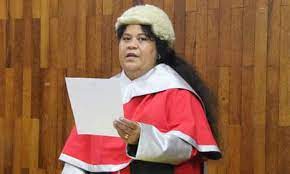Fears over democratic decline have intensified in Kiribati after the appointment of the country’s attorney-general to the position of acting chief justice.
Tetiro Semilota has previously been held in contempt of court and was the Kiribati government’s chief legal adviser when it controversially suspended five of the country’s senior judges earlier this year.
She is expected to be formally welcomed to her new role as acting chief justice in a special High Court sitting on Wednesday, having privately sworn an oath in front of President Taneti Maamau on Friday.
The Kiribati government is touting the move as win for gender equality, with Justice Semilota becoming the country’s first female chief justice.
She is also the first I-Kiribati — an indigenous person from Kiribati — to hold the position.
However, legal experts in Australia have labelled the appointment “deeply disturbing”, saying it undermines the separation of powers in Kiribati.
Australian Bar Association president Matthew Collins KC said democratic stability in the region was of crucial importance to Australia.
“It’s really important for the stability of our region that the small island nations of the Pacific are flourishing democracies,” he said.
Dr Collins said Justice Semilota’s appointment was “completely inconsistent with an independent judiciary”, which is mandated under Kiribati’s constitution.
“On the face of it, those Westminster traditions, so important to democratic societies, have been undermined,” he said.
The Kiribati government has not responded to the ABC’s questions.
It’s unclear if Justice Semilota has officially relinquished her position as attorney-general.
The development comes amid growing tensions between the Kiribati government and the nation’s judiciary, which recently saw the suspension of five foreign judges.
In September, the government stood down three Court of Appeal judges who blocked its attempt to deport Australian-born high court justice David Lambourne.
New Zealand-born chief justice William Hastings was also suspended earlier in the year, a decision that is now being reviewed by a government-appointed tribunal.
A New Zealand Ministry of Foreign Affairs and Trade spokesperson expressed “deep concern” at the time, saying all three judges had “record of long and distinguished service”.
The moves effectively left Kiribati without a functioning judiciary, leading to a massive backlog in legal cases.
Dr Collins said the appointment of Tetiro Semilota as acting chief justice would not necessarily resolve that, because she would likely face a conflict of interest in presiding over criminal cases that she approved as attorney-general.
He also said she would not be able to oversee cases related to the suspension of Lambourne and other judges, because she was the government’s chief legal adviser at the time of those suspensions.
He urged the Australian government to “do all it can to support the rule of law” in neighbouring nations.
In December last year, Justice Semilota — then as attorney-general — was found in contempt of court when she directed a government official to disobey a High Court instruction regarding Lambourne’s salary and entitlements.
Then-chief justice William Hastings did not discipline her over the breach.
In a social media statement, Kiribati’s president said he was honoured and proud to see the first I-Kiribati citizen and woman to take on the top judicial role.
He also outlined the government’s commitment to uphold the rule of law and to respect the powers of the judiciary, adding the government was ready to work with the judiciary for the betterment of Kiribati and its people.
In a statement, Justice Semilota conveyed her appreciation for the trust placed in her to take up the important role for the people of Kiribati.
Citizens have commented on Facebook, offering their praise and congratulations to Justice Semilota.
President of the Kiribati Law Society Birimaaka Tekanene said Justice Semilota’s appointment was a “starting point” to getting the country’s court system back up and running.
“I believe it is a move that the government is now taking to fill in the vacancy, the vacuum, that existed within the judiciary,” Tekanene said.
He said he had faith in Justice Semilota’s ability to do the job.
“I have no doubt that after taking an oath of office, she will be committed, she will defend the independence of the judiciary, and uphold the rule of law,” he said.
Anti-corruption groups are less confident.
Transparency International Australia chief executive Clancy Moore said the development was part of a “worrying trend” in some parts of the Pacific.
“We’re seeing increased authoritarianism, attacks on free media and civil society, and a real increase in the risk of corruption, both government and business corruption,” he said.
“This latest move is seemingly at odds with the notion of [the] separation of powers and, unfortunately, weakens democracy and transparency for the people of Kiribati.”
The island nation has faced increased geopolitical scrutiny since switching diplomatic ties from Taiwan to China in 2019 and leaving the Pacific Islands Forum this year.
Australia remains the country’s key development partner, alongside New Zealand.
Last week, the Australian High Commission donated drought relief supplies, including a desalination plant and water piping system, to the Kiribati government.
In response to questions from the ABC, a Department of Foreign Affairs and Trade spokesperson said Australia had encouraged a resolution to the situation through ongoing engagement with the Kiribati government.
In a statement, the Law Council of Australia said holding “both offices simultaneously would be inconsistent with the separation of powers”, which is also enshrined in Kiribati’s constitution.
“The attorney-general is vested with executive authority as a member of cabinet, serves as the principal legal adviser to the government, and is empowered to bring, intervene in and continue criminal proceedings on behalf of the government,” it said.
“These functions are incompatible with service as a judicial officer.
“It is essential that the people of Kiribati are served by an independent judiciary, [one that is] empowered to interpret and apply the laws and constitution of Kiribati without fear or favour”….
SOURCE: ABC PACIFIC/PACNEWS













